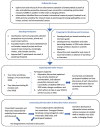Governing Antimicrobial Resistance (AMR) in a Changing Climate: A Participatory Scenario Planning Approach Applied to Sweden in 2050
- PMID: 35874997
- PMCID: PMC9298947
- DOI: 10.3389/fpubh.2022.831097
Governing Antimicrobial Resistance (AMR) in a Changing Climate: A Participatory Scenario Planning Approach Applied to Sweden in 2050
Abstract
Background: Antimicrobial resistance (AMR) is a growing global crisis with long-term and unpredictable health, social and economic impacts, with which climate change is likely to interact. Understanding how to govern AMR amidst evolving climatic changes is critical. Scenario planning offers a suitable approach. By envisioning alternative futures, stakeholders more effectively can identify consequences, anticipate problems, and better determine how to intervene. This study explored future worlds and actions that may successfully address AMR in a changing climate in a high-income country, using Sweden as the case.
Methods: We conducted online scenario-building workshops and interviews with eight experts who explored: (1) how promising interventions (taxation of antimicrobials at point of sale, and infection prevention measures) could each combat AMR in 2050 in Sweden given our changing climate; and (2) actions to take starting in 2030 to ensure success in 2050. Transcripts were thematically analyzed to produce a narrative of participant validated alternative futures.
Results: Recognizing AMR to be a global problem requiring global solutions, participants looked beyond Sweden to construct three alternative futures: (1) "Tax Burn Out" revealed taxation of antimicrobials as a low-impact intervention that creates inequities and thus would fail to address AMR without other interventions, such as infection prevention measures. (2) "Addressing the Basics" identified infection prevention measures as highly impactful at containing AMR in 2050 because they would contribute to achieving the Sustainable Development Goals (SDGs), which would be essential to tackling inequities underpinning AMR and climate change, and help to stabilize climate-induced mass migration and conflicts; and (3) "Siloed Nations" described a movement toward nationalism and protectionism that would derail the "Addressing the Basics" scenario, threatening health and wellbeing of all. Several urgent actions were identified to combat AMR long-term regardless which future un-folds, such as global collaboration, and a holistic approach where AMR and climate change are addressed as interlinked issues.
Conclusion: Our participatory scenario planning approach enabled participants from different sectors to create shared future visions and identify urgent actions to take that hinge on global collaboration, addressing AMR and climate change together, and achieving the SDGs to combat AMR under a changing climate.
Keywords: Sustainable Development Goals (SDGs); Sweden; alternative futures; antimicrobial resistance (AMR); climate change; interventions; scenario planning.
Copyright © 2022 Lambraki, Cousins, Graells, Léger, Abdelrahman, Desbois, Gallagher, Staaf Larsson, Mattson, Henriksson, Troell, Søgaard Jørgensen, Wernli, Carson, Parmley and Majowicz.
Conflict of interest statement
BM is an employee of the Swedish Pharmaceutical Industry Association, and was previously employed by Pfizer AB. He is also a shareholder of several pharmaceutical companies. The remaining authors declare that the research was conducted in the absence of any commercial or financial relationships that could be construed as a potential conflict of interest.
Figures
References
-
- O'Neill J. Tackling Drug-resistant Infections Globally: Final Report and Recommendations. (2016). Available online at: https://amr-review.org/sites/default/files/160518_Finalpaper_withcover.pdf (accessed November 1, 2021).
-
- World Bank . Drug-Resistant Infections a Threat to Our Economic Future. (2017). Available online at: www.worldbank.org (accessed October 1, 2021).
-
- Grace D. Review of evidence on antimicrobial resistance and animal agriculture in developing countries. UK: Evidence on Demand; (2015).
-
- Henriksson PJ, Rico A, Troell M, Klinger DH, Buschmann AH, Saksida S, et al. . Unpacking factors influencing antimicrobial use in global aquaculture and their implication for management: a review from a systems perspective. Sustain Sci. (2018) 13:1105–20. 10.1007/s11625-017-0511-8 - DOI - PMC - PubMed
Publication types
MeSH terms
Substances
LinkOut - more resources
Full Text Sources
Medical



